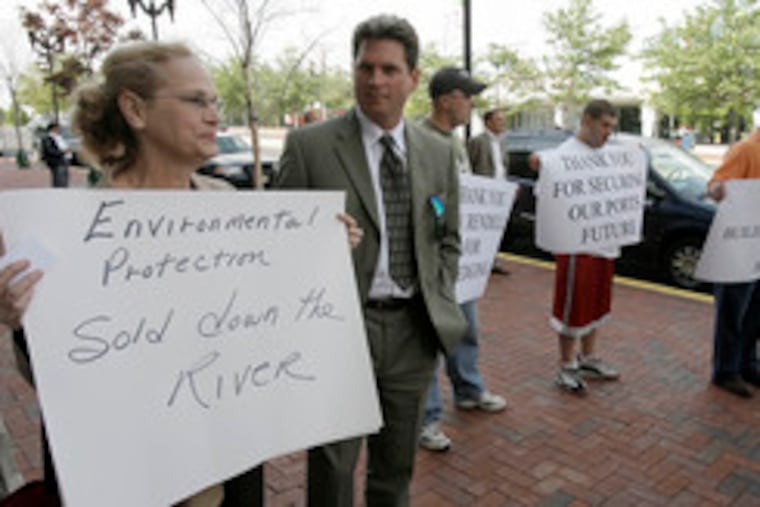Governors' friend helped to mediate dredging dispute
The agreement ending the standoff between Pennsylvania and New Jersey over the Delaware River channel-deepening project was reached in early March between the states' governors in the law office of their friend, Philadelphia lawyer Steve Cozen.

The agreement ending the standoff between Pennsylvania and New Jersey over the Delaware River channel-deepening project was reached in early March between the states' governors in the law office of their friend, Philadelphia lawyer Steve Cozen.
The story of Cozen's behind-the-scenes role as a mediator over more than a year emerged yesterday as Govs. Rendell and Corzine announced the deal that moves sponsorship of the project from the Delaware River Port Authority to the Philadelphia Regional Port Authority.
The DRPA officially approved that move by a unanimous vote yesterday during its first meeting since the dispute between the two states heated up 17 months ago.
Cozen said yesterday that the agreement came about because he received a call from Rendell "telling me there was an impasse with the State of New Jersey and that it was having an adverse impact on the Delaware River Port Authority." Rendell "is a longtime friend of mine, somebody I have done a lot of behind-the-scenes work for.
"He knew I was friendly with Jon Corzine and wondered if I could reach out to him and see what the differences are and how they could be resolved."
Cozen said he met with the governors at a Philadelphia law firm, as well as in Trenton and Harrisburg. He also had many phone conversations with state officials and talked with disparate interest groups.
By early March - during a meeting at Cozen's law office with the governors, their chiefs of staff, and DRPA Vice Chairman Jeffrey Nash - a deal was struck. The final execution of the agreement was delayed when Corzine was seriously injured in a traffic accident.
Yesterday, flanked by supportive union members outside One Port Center in Camden, where the DRPA meets, Rendell said the agreement would make the port "the fastest-growing and most economically charged" on the East Coast.
He said the deepening of the channel from 40 feet to 45 feet would clear the way for several international shipping companies and terminal operators to make millions of dollars of investments.
"This historic agreement will allow for increased commercial shipping traffic, investment and economic development in our region," Rendell said. "I believe nothing is more important to the future of the Ports of Philadelphia, southern New Jersey and Delaware than this project."
Corzine, who did not attend the news conference, had opposed the dredging, but noted in a statement that "this agreement will allow the DRPA board to resume meeting." Millions of dollars in capital projects were held up while Rendell, the DRPA chairman, refused to call a board meeting.
"My position on dredging itself has not changed," Corzine said. "I still have serious environmental and economic concerns about the wisdom and propriety of dredging."
The bistate deal calls for Pennsylvania to bear the cost of the project, to receive the dredge spoils, and to obtain an updated environmental-impact study from the U.S. Army Corps of Engineers.
Both states would work quickly to expedite the permitting process, support the expansion of PATCO into Gloucester County and Philadelphia, and split the $38.5 million originally set aside by the DRPA for deepening the channel. Pennsylvania will use its funds for dredging while New Jersey will focus on environmental and port-infrastructure improvements.
As Rendell went over the essentials of the agreement yesterday, he praised Cozen's role as a go-between who played a key role in the dredging deal.
Nash, a former opponent, also thanked Cozen. "This is a good deal for the region and a great deal for New Jersey," he said at the DRPA meeting that followed.
The agreement had its detractors, however. U.S. Rep. Rob Andrews (D., N.J.) said he was "uncomfortable with anybody conducting a secret meeting involving a half-billion dollars," his estimated cost of the dredging.
"It was decided in a lawyer's office, where there was no record, no minutes, no press," he said. "Here is an issue that involves a half-billion dollars in public money, the drinking water for four million people, and a substantial regional question."
Andrews, like a host of environmentalists, is concerned about the dredging's effects on the environment and a "rushed" environmental-impact statement and permitting process. He also remains concerned about the disposition of the dredge spoils.
New Jersey State Sen. Diane Allen (R., Burlington) described the agreement as a backroom political deal. "By knuckling under to Gov. Rendell's demands, the governor has ceded control over the Delaware River to the Commonwealth of Pennsylvania, and endangered our environment," Allen said.
Jeff Tittel of the New Jersey Chapter of the Sierra Club said Corzine had "broken his word. This deal is dirtier than the dredged spoils from the Delaware River."